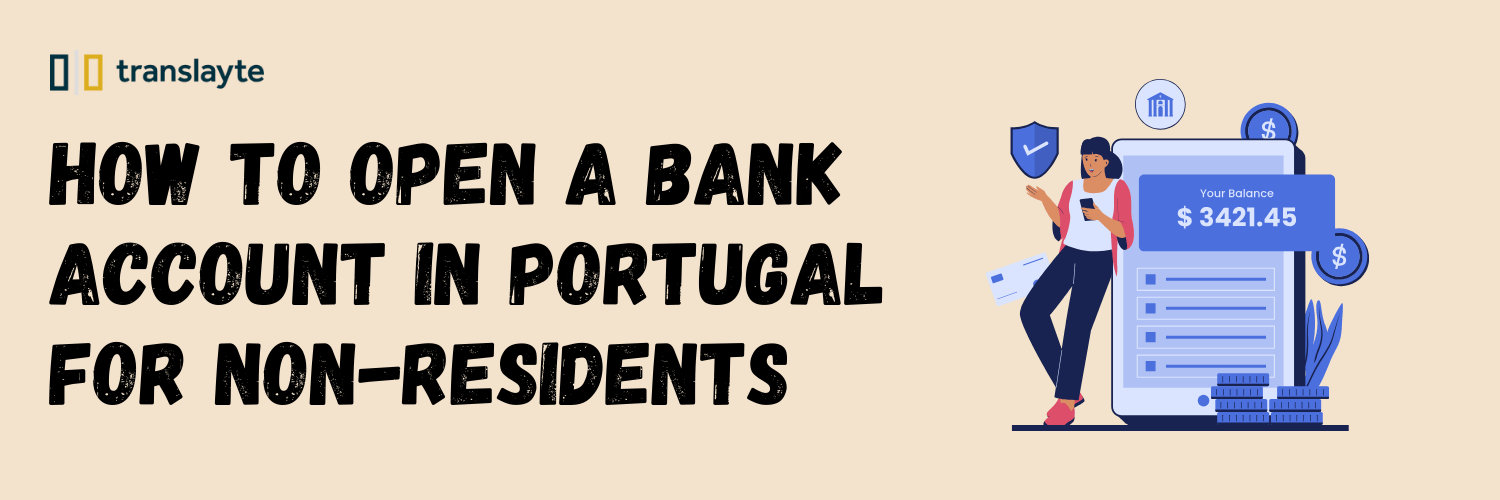Why non‑residents need a bank account in Portugal
Non-residents must open a bank account in Portugal to facilitate visa and residency permit applications and investments, and manage daily finances with a Portuguese debit card. Here's an overview of each purpose:
Residency and visa requirements
A Portuguese bank account is often a requirement for some visa and residency paths in Portugal. For example, if you apply for a D7 visa in Portugal, the authorities usually expect proof of funds to be in a Portuguese bank account. This means you need a local bank account. Other paths, such as the D8 Visa (Portuguese Digital Nomad Visa), D2 Visa (Entrepreneur Visa), Golden Visa, and residency by investment, also require opening a bank account.
Facilitate investments
You need a local bank account to invest in Portuguese real estate for business or residency paths. If you are in Portugal for business, you need a local account to register or engage in other financial investment activities.
Daily financial management
In Portugal, you’ll need local currency or a debit card for daily purchases, bill payments, and other activities. Opening a Portuguese bank account ensures you have a debit card and can process payments seamlessly.
Access to Portuguese banking services
Opening a Portuguese bank account as a non-resident allows you access to various services. This includes personal loans, overdrafts, and mortgages, crucial for living or working in Portugal.
Types of bank accounts in Portugal
In Portugal, there are three main types of bank accounts, namely: Conta corrente (current account), Conta poupança (instant-access savings account), and Conta de depósito a prazo (time-deposit savings account). Here's an overview for each;
Conta corrente (current account)
This is the most common type of bank account used for everyday transactions, such as paying bills, withdrawing cash, and making transfers. It's best if you’re a non-resident moving to Lisbon for a 1-year work contract and need a simple account. You can use the account to pay your monthly rent to your landlord, buy groceries, and receive your salary in euros. A Conta corrente gives you a Portuguese IBAN, so your employer can pay you directly, and you can set up direct debits for bills.
Note: You can also open a Conta Corrente Cointestada (Joint Current Account) with your partner. This is best for couples or business partners who want shared access to funds.
Conta poupança (instant-access savings account)
This account lets you save money while maintaining easy access to your funds. It usually has a slightly higher interest rate than a current account. The account is linked to a conta corrente, meaning you need a current account before opening a poupança.
Conta de depósito a prazo (time-deposit savings account)
This is a fixed-term deposit account offering a higher interest rate. Unlike the others, the Conta de depósito a prazo requires you to keep your money deposited for a fixed period. The duration can be 6 months, 12 months, or 3 years. When opening the account, you must make a minimum deposit ranging from €500 to €5,000, depending on the bank. This Portuguese bank account is ideal for non-residents who wish to securely store large sums while earning a higher interest rate than a standard account.
Conta Júnior (Junior Account / Children’s Account)
Many Portuguese banks offer contas júnior, which are special accounts designed for children and teenagers. These accounts are designed to instil financial responsibility early, enabling parents or guardians to save on behalf of their children. It generally has lower or zero fees and requires parental oversight for management.

Step‑by‑step guide for opening a Portuguese bank account
To open a Portuguese bank account as a non-resident, you'll need your passport, a Portuguese Tax Identification Number (NIF), and proof of your foreign address and income. Depending on the bank's requirements, you can open a Portuguese bank account online or in person. Here are the steps to follow:
Get your NIF (Número de Identificação Fiscal)
The NIF is your Portuguese tax identification number, and it's required to open a bank account in Portugal. You can get one in person at the Finanças office in Portugal, or a tax representative, such as a lawyer or agent.
Note: If you don’t live in Portugal or the EU, you need a fiscal representative.
Choose a Portuguese bank or account type
Research banks to understand their services and requirements. Some banks offer services tailored to non-residents, while others provide online application processes. You should also confirm the required documents to ensure everything is in order. Some top banks in Portugal to consider include Millennium BCP, Novo Banco, Santander Totta, ActivoBank, BPI, and CGD.
Prepare required documents
Gather all required documents once you have decided on the bank. Ideally, you should have identity documents, such as a passport or NIF, to prove your residency. If you use foreign documents, you must also provide certified Portuguese translations to ensure they are accepted.
Submit your application online or in a branch
You can submit your application in person or online. The options available often depend on the bank and its requirements. You’ll sign account contracts, data privacy, CRS/FATCA, and PEP (politically exposed person) declarations during the application process. For joint accounts, you’ll choose “e” (both sign) or “ou” (either can sign).
For in-branch applications: You must book an appointment, bring all necessary documents, and expect on-the-spot questions regarding the source of funds and account usage.
For remote / video onboarding: Some banks offer it, but many restrict remote opening for non-residents. If you can’t attend, consider a power of attorney to a lawyer/agent.
Initial deposit & activation.
If the application is approved, you’ll need an initial deposit, typically from €50 to €500. You will also receive/activate your debit card and set up online banking. Expect to pay maintenance depending on the bank. You will also receive periodic requests for updated proof of address or income for AML/CRS purposes.
Do you need translated and certified documents for Portuguese banks? Request a free quote to get started.
Documents required for non‑residents
Documents required to open a Portuguese bank account include:
Identity & tax documents
Passport (valid)
NIF certificate/printout
Address & status
Proof of address, such as a foreign utility bill or a bank statement, usually ≤3 Months old. Note: Some banks still require proof of Portuguese address, even for non-residents.
Proof of profession/income or source of funds (employment contract, payslips, tax return, company registration if self-employed)
Immigration (if applicable)
Compliance forms
Translations & legalisation
Some banks may accept documents in English. If yours aren’t in Portuguese/English, get certified translations (and, if requested, notarisation/apostille).
Optional but helpful
Bank reference letter from your home bank
A Marriage certificate is sometimes needed for joint accounts or spousal banking.
Recent bank statements (to speed up AML checks)
Portuguese mobile number
Note: Bring original and clear copies of all documents for verification during your in-person appointment.

Opening a Portuguese bank account online vs in‑person
While some banks allow you to open a Portuguese bank account online, most still require an in-person visit or identity verification through a lawyer or power of attorney. Here's what you should know about both options:
Online/partial remote onboarding
A few banks, especially those with expat-friendly services, allow you to start the application online. They include
Millennium BCP: You can submit your details online and upload documents. However, final verification often requires a branch visit or certified copies from a lawyer.
ActivoBank: Best for younger clients and tech-savvy expats, and allows digital onboarding for residents. Non-residents may still be asked to attend a branch appointment to finish compliance checks.
Novo Banco: Allows remote account opening with power of attorney, particularly for property buyers and investors abroad.
Digital-first banks (e.g., Revolut, Wise): The entire process is online. However, they don’t always offer the same comprehensive range of services, such as Portuguese IBANs, which utility companies and landlords often require.
Note: Although the process begins online, expect the bank to request face-to-face verification, a video call, or notarised/certified documents.
In-person account opening
For many non-residents, opening an account in person at a Portuguese branch remains the most reliable and straightforward option. Most banks prefer in-person visits to reduce compliance risks. It also allows staff to confirm your identity directly. This option is best suited for non-residents buying property, working, or staying in the country for an extended period.
Best banks in Portugal for non‑residents
Bank | Benefits | Languages & service | Best for |
Millennium BCP | Largest private bank in Portugal, strong branch network, flexible accounts for residents & non-residents | Portuguese and English are widely available in city branches | Expats, property buyers, professionals needing complete services |
Santander Totta | Global brand, easy cross-border transfers for Santander customers, strong expat focus | Portuguese, English, and Spanish in larger branches | Foreigners with international links, frequent transfers |
Novo Banco | Popular with non-resident investors and property buyers, remote opening possible with a lawyer/POA | Portuguese and English support available | Non-residents investing in Portugal or buying property |
ActivoBank | Digital-first bank (owned by Millennium BCP), app-driven with lower fees | Portuguese and English app support | Younger expats, freelancers, digital nomads |
Caixa Geral de Depósitos (CGD) | Portugal’s largest state-owned bank, with solid stability, nationwide coverage | Portuguese, some English in major cities | Retirees, families, conservative savers |
Revolut / Wise (digital challengers) | Entirely online, fast account setup, low-cost international transfers; not always suitable for mortgages/utilities | App in English + multiple languages | Short-term expats, students, travellers |
Fees, minimum deposits and other costs
Monthly maintenance fees: €5 - €25 (waived if you maintain a minimum balance or credit salary/pension).
Minimum opening deposit: €25 - €500.
Time deposits (depósitos a prazo): Typically require a minimum of €500 - €5,000.
Debit card (Multibanco): Generally free or included in the account package.
Credit card: €20 - €150 per year, unless bundled with premium accounts.
Online & mobile banking: The free MB Way app is widely available for instant transfers.
SEPA transfers (within EU/EEA): Free or low-cost.
Non-SEPA transfers (outside EU/EEA): Fees vary
ATM withdrawals in Portugal: Free at Multibanco
Dormant/inactive accounts may incur extra charges if unused for 12 months or more.
Note: Some banks (ActivoBank, specific Santander packs) now advertise €0 maintenance if you use digital services.
Common challenges & how to overcome them
Opening a bank account in Portugal as a non-resident can feel overwhelming. Here are the most common obstacles and solutions
Language barriers: Many bank staff speak only Portuguese outside Lisbon, Porto, and Algarve branches. Prepare certified translations of your key documents (passport, proof of address, and income proof). Bring a translator or choose banks with Staff who speak English.
NIF bureaucracy: The Número de Identificação Fiscal (NIF) is mandatory for banking. But applying can be slow if you do it alone. Hire a fiscal representative or a lawyer to obtain your NIF, even if you apply remotely.
Proof of residence: Some banks insist on a Portuguese address for account opening. Provide evidence of foreign residence with a certified translation, or use a lawyer/POA to explain your non-resident status.
Document requirements: Banks may reject documents that are not in Portuguese/English. Get certified translations from authorised translators or companies. When required, get an apostille to authenticate foreign documents.
Don't allow documentation issues to delay your Portuguese bank opening process. Prepare your documents now. Translayte provides certified translations and apostille services for bank and visa applications in Portugal. Request a free quote to get started.


.jpg)
